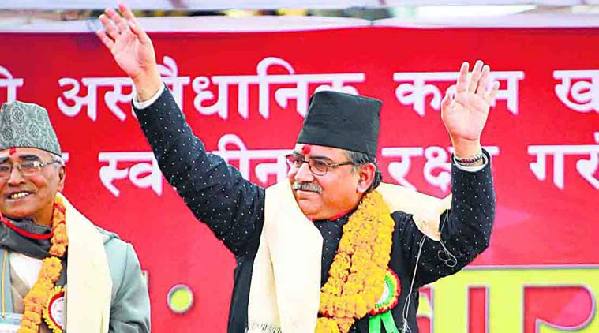Change in Nepal
- By Shastri Ramachandaran
 0 Comment(s)
0 Comment(s) Print
Print E-mail China.org.cn, August 4, 2016
E-mail China.org.cn, August 4, 2016
|
|
|
Nepalese Maoist leader Pushpa Kamal Dahal alias Prachanda |
The return of Nepalese Maoist leader Pushpa Kamal Dahal alias Prachanda as Prime Minister after more than seven years comes at a crucial juncture. Prachanda, meaning The Fierce One, has signed a three-point agreement with the agitating Madhesis - the people in the plains of Nepal bordering India - which ensures wider support for him than his predecessor enjoyed, the notable Khadga Prasad Sharma Oli.
Prachanda's Communist Party of Nepal-Maoist Centre (CPN-MC) walked out of the coalition government led by Oli to join hands with the Nepali Congress to clinch a deal for him to become Prime Minister. Besides the support of his own party, CPN-MC, Prachanda now commands the support of the Nepali Congress and the Madhesi Front, which represents a majority of the Madhesi parties. The Madhesi parties account for 42 members in the 595-member Parliament and chances are that they will join the government.
Oli, who leads the Communist Party of Nepal-UML, had to quit last week when the Maoists withdrew their support of the coalition government. Oli had alienated the Madhesis, the plains people of Indian origin, by neglecting their interests in the constitutional scheme. They wanted the constitution to provide for redrawing the provincial boundary and for greater parliamentary representation. The stonewalling of these demands led to a violent agitation that claimed several lives some months ago.
He accused India of fomenting the agitation and imposing an economic blockade against Nepal. His accusations not only worsened India-Nepal bilateral relations but aggravated his problems at home and gave rise to discord within the coalition government.
Therefore, it is not surprising that Oli's exit and the re-emergence of Prachanda at the helm of Nepal's government have been welcomed in India, by the government, political parties and the media. Oli failed to read correctly the importance of New Delhi's role for his political survival.
All Nepalese mainstream parties have a strong anti-Indian streak. These parties give full vent to their anti-Indian sentiment when in the opposition. Once in office, these same parties tone down their rhetoric and go along with New Delhi on issues where cooperation is a must. It is no secret that being anti-Indian beyond a point would be political suicide for a Nepalese prime minister.
Oli miscalculated and exceeded these limits. He did not heed the Government of India's request to defer the promulgation of the constitution and make its provisions more inclusive and representative. He clashed with India in the United Nations on the blockade of Nepal, which he termed "more inhuman than war."
The coalition government of Oli enjoyed excellent relations with China. However, China-Nepal cooperation tends to get affected when India-Nepal relations are derailed. China is more interested in investing in Nepal and quickening the pace of Nepal's economic development than in encouraging Kathmandu to court conflict with New Delhi.
Prachanda, who first assumed office as Nepal's Prime Minister eight years ago during this same month, had to step down in 2009. He is a more seasoned political leader with experience in dealing with New Delhi and Beijing; more importantly, he is adept at avoiding conflict with both these countries while navigating a path that optimizes greater benefits for Nepal from China and India.
He has rejected suggestions and innuendos that he would be pro-India or pro-China and affirmed that he would be acting in the "best interests of Nepal."
Last week, soon after it became clear that Prachanda would be replacing Oli as Prime Minister, he assured China that key bilateral deals, including those which may affect India, reached by Oli's government, would be honoured and implemented after he takes over.
This assurance came in the course of talks with the Chinese Ambassador Wu Chuntai on July 29. The Chinese envoy was emphatic about Beijing's "full support" to the new coalition government under Prachanda.
Prachanda said the deals reached during Oli's regime were made by the coalition government that included his party. The Nepal-China agreements were the outcome of deals made by the government that he had led earlier, according to a statement from Prachanda's secretariat. The government would not only implement existing agreements with China but also sign new ones, he said.
Ambassador Wu pledged full support of the Chinese government, the Communist Party of China and the Chinese people to the new government of Prachanda. Wu's remarks are significant in the context of allegations that India had a hand in toppling Oli and paving the way for Prachanda to again lead a coalition government.
The fact that New Delhi and Beijing have welcomed this change of leadership in Kathmandu suggests that Prachanda can count on the support and cooperation of both China and India in the implementation of the new constitution, reconstruction, and development projects which he has identified as his top priorities.
Shastri Ramachandaran, an independent Indian political and foreign affairs commentator, is co-editor of the book "State of Nepal." Currently, he is a senior consultant and editor of the China-India Dialogue published by the China International Publishing Group (CIPG).
Opinion articles reflect the views of their authors, not necessarily those of China.org.cn.







Go to Forum >>0 Comment(s)